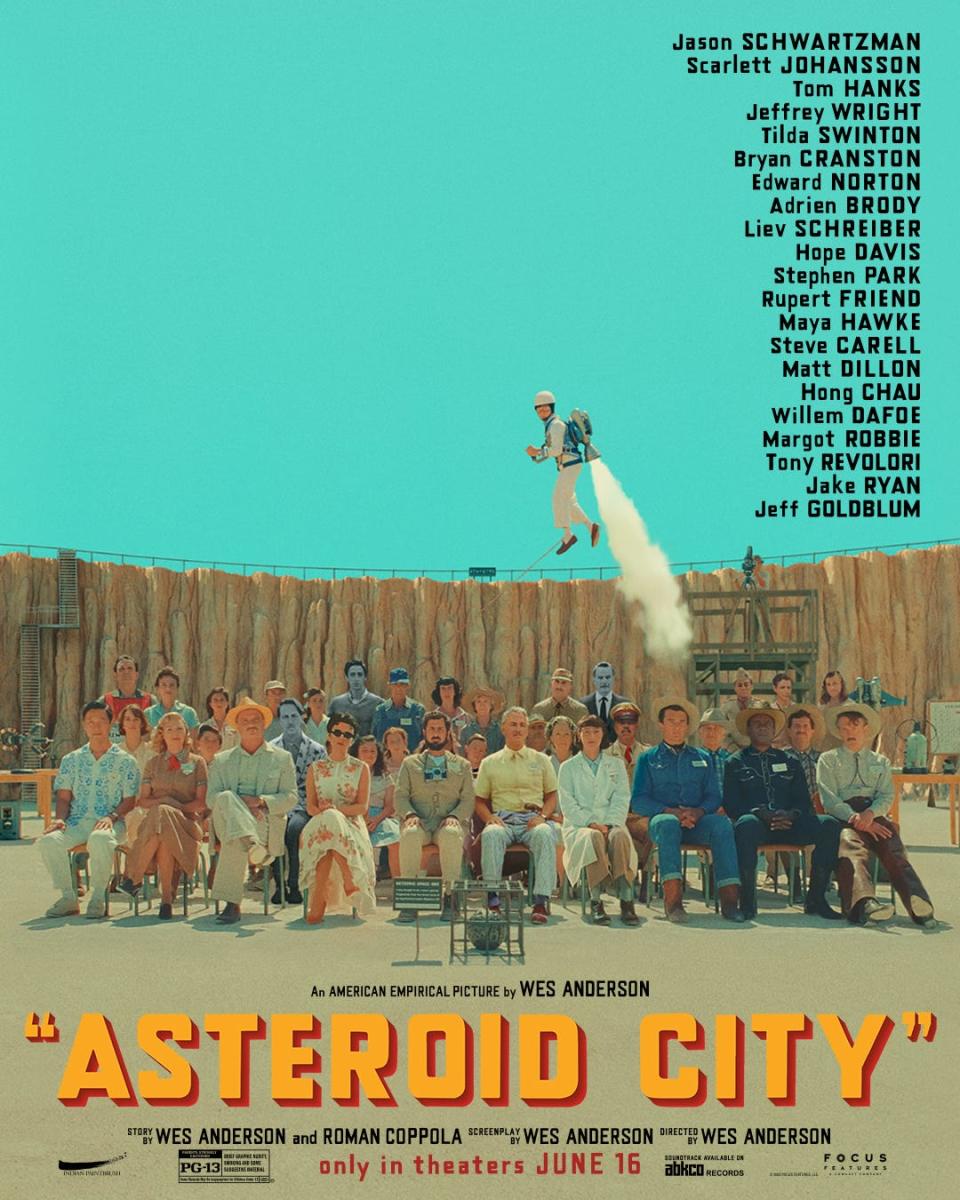Review: Why 'Asteroid City' is different than any other Wes Anderson movie
- Oops!Something went wrong.Please try again later.
- Oops!Something went wrong.Please try again later.
On Friday, June 23, Wes Anderson's 11th feature film, "Asteroid City," was released to theaters. I heard the buzz all weekend: this movie is different, this one you have to see. But I was resistant. I've seen it all before, I thought. I've seen enough pastel-palate camera whips and quick zooms and close-ups of Jason Schwartzman's non-emotive, but clearly sad face. Then it was Monday, and I was bored, and I caved.
At 8 p.m. Monday evening, I walked into Clifton's homey Esquire Theater, grabbed my oversized popcorn and oversized soda, reclined in an overly comfy chair and chuckled for a thoroughly exciting and enjoyable 105 minutes.
"Asteroid City" is not just another cute and pretty Wes Anderson classic. It has a different feel to it. Don't get me wrong, I love "Moonrise Kingdom" (2012) and "Grand Budapest Hotel" (2014), but the style was starting to feel rote and overdone with Anderson's latest feature, "The French Dispatch" (2021). Maybe this was his idea of turning it up a notch.
What most distinguishes "Asteroid City" from Wes Anderson's movies of old is the story's layered structure.
The layered plot of Wes Anderson's 'Asteroid City'
Let me try to explain it the way a Wes Anderson character would:
"Asteroid City" is a movie that tells the story of the making of a fictitious play and the cinematic reproduction of that play, also called "Asteroid City," about a festival in the fictional town of Asteroid City celebrating an asteroid's contact with Earth in 3007 B.C. and the festivalgoers' search for meaning in life, all under the guise of a "backstage" look at the play on a black-and-white TV broadcast by a mustachioed news anchor played by Bryan Cranston.
Does that make sense? Let me try again.
"Asteroid City" is the name of a fictional town where a fictitious play, also "Asteroid City," takes place. The play tells the story of how a host of characters search for meaning amidst the theatrics of a festival celebrating an asteroid's contact with Earth in 3007 B.C. The movie, "Asteroid City," the one I paid to see, is set up as the fictitious TV broadcast of a "backstage" look at the making of "Asteroid City," the play, and a cinematic reproduction of that play, hosted in black and white by a mustachioed news anchor played by Bryan Cranston.
Better?
Or we could just say the movie follows two arcs: the play and the making of the play. Both are wonderful and full of stars.
In "Asteroid City," the play, Jason Schwartzman is Augie Steenbeck, the widowed war photographer that falls in love with Hollywood starlet Midge Campbell, played by Scarlett Johanssen. They arrive in the town each with their own children, two of which (Jake Ryan and Grace Edwards) are contestants at the festival, and also fall in love.
In the making of the play, Jason Schwartzman plays Jones Hall, the Broadway star that plays Augie Steenbeck, and falls in love with the playwright Conrad Earp, played by Edward Norton. Both of Schwartzman's characters are sad and lost, and in the end, not particularly found, though not desolate either.
“I still don’t understand the play!” Schwartzman's Hall says to his director, Schubert Green, buffly played by Adrien Brody.
“Doesn’t matter," Green responds. "Just keep telling the story.”
Tom Hanks plays Stanley Zak, the posh, overly flirtatious and slightly wise father of Steenbeck's late wife, unnamed and unscripted, though theoretically played by Margot Robbie as seen in the 11th hour when Schwartzman's Hall runs off stage to get some air and finds Robbie on the opposite balcony, taking a break from her own Broadway production.
Steve Carell plays a motel manager with a vending machine for everything, even real estate. Tilda Swinton plays the resident scientist, Jeffrey Wright the general on call. Willem Dafoe is an energized acting coach, Liev Schrieber and Hope Davis are disgruntled parents, and of course, Jeff Goldblum appears for roughly two seconds, partially dressed in an alien costume, philosophizing about his role as a speechless alien.
And then there's the ending, the biggest puzzle of them all.
(Spoiler alert, I guess.)

The movie ends in Dafoe's acting class. Norton sits on a chair, center stage, flanked by Dafoe and Brody. He is puzzled, and looking out at the audience (which is the acting students, who are also the actors that make up the play and the movie).
Norton explains that he wants to write a scene where all the actors are sleeping, but he doesn't know how to write it. He needs their help.
"You can't wake up if you don't fall asleep!" someone yells, almost out of nowhere. Then the line is repeated by another cast member. Then another, and another, and another, all in quick succession. Before long, the whole cast is chanting the words, over and over, facing the camera: "You can't wake up if you don't fall asleep! You can't wake up if you don't fall asleep! You can't wake up if you don't fall asleep!"
I do not pretend to understand it, but it is different.
I like it.
This article originally appeared on Cincinnati Enquirer: 'Asteroid City' review: This is a different kind of Wes Anderson film

